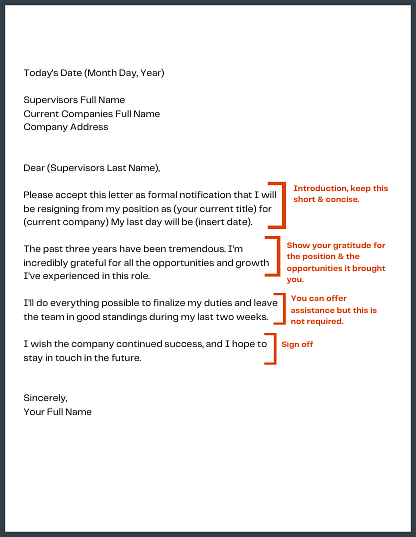Resigning can be uncomfortable & with so many moving pieces it's challenging to know what the right things to say & do are. You want to resign professionally but what does that entail? From resignation letters to exit interviews we've got you covered. Resigning can be intimidating but we promise it doesn't have to be.
Reevaluate
Before you officially resign, the first step should always be to weigh your options & ensure you're leaving for the right reasons. We suggest making a pros & cons list of your new & current position. For example, the new position may offer higher compensation, but does that outweigh the benefits you have at your current position? In addition, if you're leaving because of compensation or benefits it could always be worth discussing with your current employer if a pay increase is available before you leave.
Don't Tell Everyone
If you've decided resigning is the best option we advise you to avoid telling anyone else in the company before you speak with your supervisor; you want your resignation to come from you, not through the grapevine.
Create a Formal Resignation Letter
A resignation letter is a written document that notifies your employer that you will be departing your position. It formalizes your resignation & is an act of courtesy. This letter will be given to your superior at the time of your resignation. For your benefit, we've included examples below.

Schedule Time With Your Supervisor
Finally, it's time to schedule a time to speak with your employer. We suggest having an in-person conversation rather than doing this over the phone or virtually if possible. You'll want this conversation to end on a positive note so you can obtain a reference.
Tips for speaking with your supervisor:
Don't Bad Mouth the Company
Regardless of whether you liked your position or not you should never bad-mouth the company during your final interview. There is no advantage of leaving on a negative note. Leave the venting & complaining to a conversation with friends & family or if they provide you with an exit interview form, express it there.
Frame Your Departure in a Positive Light
Refrain from telling your supervisor all of your complaints about the job, you want to frame your departure positively. Instead, try expressing your gratitude for the opportunities the position brought you & then state that you're leaving because your needs have shifted.
Give An Adequate Time Notice
During this conversation, you'll want to notify your employer of your last day. This will already be in your resignation letter but it's important that you're providing adequate notice. For example, if you're last day is March 15th, you wouldn't want to be having this conversation on the 14th. Telling an employer you're leaving tomorrow or even by the end of the week can leave them scrambling to find your replacement & cover all of your duties. We highly recommend giving at least a two-week notice.
Offer Help
Losing an employee can be a major loss for a company, therefore if you're able to, you could offer your assistance in helping find your replacement & or helping train the replacement. This is not required but it can help you leave on a positive note.
Ask For a Reference
Before you wrap up your conversation, you'll want to ask for a reference. However, we encourage you to only ask if you believe this supervisor would have positive things to say about you. In addition, refrain from telling your supervisor that you're adding them as a reference, you want to be sure you're asking, not telling. Below are casual ways to ask for a reference.
"Would you be okay with me putting you down as a reference?"
"Are you comfortable with being a reference on my resume?"
If they say yes, you'll want to ask what the best number to reach them at would be & express your gratitude for their willingness to help.
You've got this!
Resigning can be difficult, but if you're confident in your decision & remain courteous throughout the process everything will be okay.


